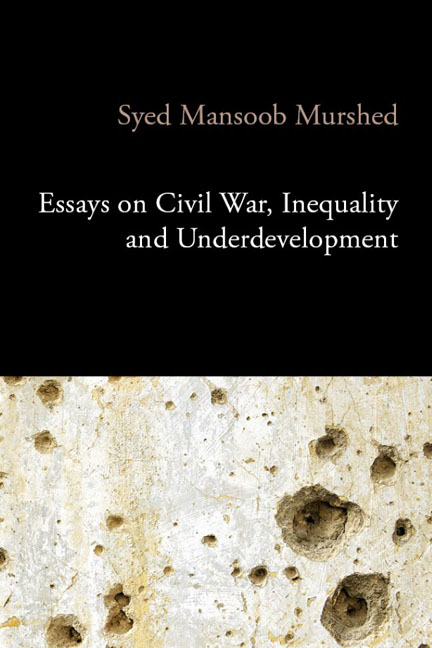Book contents
- Frontmatter
- Contents
- Preface
- Tables and figures
- 1 Conflict, civil war and underdevelopment
- 2 Revisiting the greed and grievance explanations for violent conflict
- 3 Greed, grievance and globalization
- 4 Economic dimensions of the liberal peace and its implications for conflict in developing countries
- 5 Enforcing peace agreements through commitment technologies
- 6 The conflict–growth nexus and the poverty of nations
- 7 Conflict and fiscal capacity
- 8 Does civil war hamper financial development?
- 9 The clash of civilizations and the interaction between fear and hatred
- 10 Transnational terrorism as a spillover of domestic disputes in other countries
- 11 Quantitative restrictions on the flow of narcotics: supply and demand restraints in a North–South macro-model
- 12 Spatial-horizontal inequality and the Maoist conflict in Nepal
- 13 Socioeconomic determinants of everyday violence in Indonesia: an empirical investigation of Javanese districts, 1994–2003
- 14 Not loving thy neighbour as thyself: trade, democracy and military expenditure explanations underlying India–Pakistan rivalry
- Acknowledgements
- References
- Index
2 - Revisiting the greed and grievance explanations for violent conflict
Published online by Cambridge University Press: 09 January 2024
- Frontmatter
- Contents
- Preface
- Tables and figures
- 1 Conflict, civil war and underdevelopment
- 2 Revisiting the greed and grievance explanations for violent conflict
- 3 Greed, grievance and globalization
- 4 Economic dimensions of the liberal peace and its implications for conflict in developing countries
- 5 Enforcing peace agreements through commitment technologies
- 6 The conflict–growth nexus and the poverty of nations
- 7 Conflict and fiscal capacity
- 8 Does civil war hamper financial development?
- 9 The clash of civilizations and the interaction between fear and hatred
- 10 Transnational terrorism as a spillover of domestic disputes in other countries
- 11 Quantitative restrictions on the flow of narcotics: supply and demand restraints in a North–South macro-model
- 12 Spatial-horizontal inequality and the Maoist conflict in Nepal
- 13 Socioeconomic determinants of everyday violence in Indonesia: an empirical investigation of Javanese districts, 1994–2003
- 14 Not loving thy neighbour as thyself: trade, democracy and military expenditure explanations underlying India–Pakistan rivalry
- Acknowledgements
- References
- Index
Summary
Introduction
Civil war is a multi-faceted problem. Not only does it produce human tragedies on a colossal scale, but it creates humanitarian crises that are of concern to the international community, as well as contributing to global and regional insecurity. Civil war is also a major cause of underdevelopment, and perpetuates poverty, see Murshed (2002a; Chapter 1 of this book) and Collier et al. (2003). The number of countries embroiled in a civil war increased up to 1994, and has since declined (Hegre 2004). See Harbom et al. (2006) for an enumeration of the number of armed conflicts in the post-Second World War period. The number of new civil wars emerging also seems to have fallen in the last decade (Hegre 2004). But the average duration of civil wars, standing at 16 years in 1999, does not exhibit a downward trend (Fearon 2004). For all of these reasons ending conflict or reducing its intensity must be a very high policy imperative in the development agenda.
Civil wars are not a homogenous phenomenon. Their origins, motivations and objectives vary. A useful guide to the typology of conflict can be found in Besancon (2005). The discussion on the typology of civil war points to four broad types: genocides, revolutions or rebellions against the state, secessionist wars and internationalized wars (where adjoining states or the great powers get involved). Many examples of contemporary conflict do not always fit neatly into only one of the categories mentioned. Besides civil wars, there are other forms of largescale organized violence. Transnational terrorism is the most important ‘other’ type of collective violence, where the perpetrators have a very different motivation compared to participants of civil wars. In addition, we also have routine and sectarian violence where the state is not a direct protagonist (hence they are not civil wars).
According to the rational choice paradigm, conflict is a result of choice. This may be of a myopic nature, as negotiated settlements, which avoid the losses that ensue from war, are usually Pareto superior.
- Type
- Chapter
- Information
- Essays on Civil War, Inequality and Underdevelopment , pp. 9 - 34Publisher: Agenda PublishingPrint publication year: 2021



